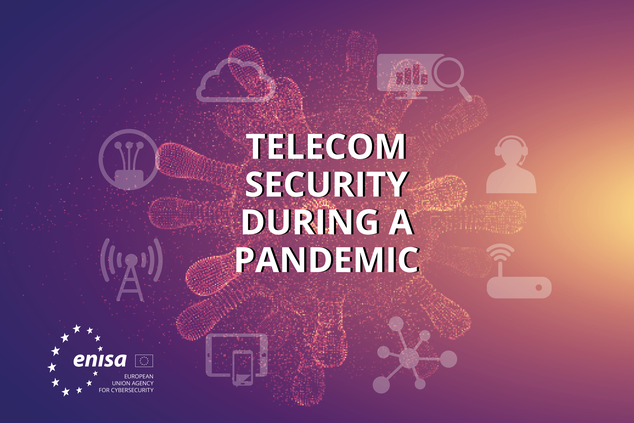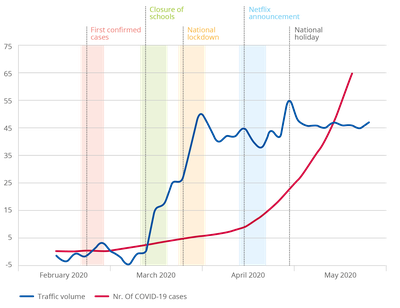ENISA Report Highlights Resilience of Telecom Sector in Facing the Pandemic
ENISA is releasing its ‘Telecom Security During a Pandemic’ report at the 32nd meeting of EU telecom security authorities. Underlining the current strength of the sector in the face of the pandemic, the report also calls for increased cooperation, as telecommunications become more and more essential for Europe’s society and economy.
Published on November 26, 2020

Today, at the 32nd meeting of EU telecom security authorities, the European Union Agency for Cybersecurity (ENISA) is releasing its Telecom Security During a Pandemic report, which gives an overview of initiatives and good practices in the telecom sector to mitigate the impact of the pandemic. The report highlights the resiliency of telecom networks and services during the pandemic, which sustained major fluctuations in usage and traffic. The report also points to the need for increased cooperation between the public and private sectors as the role of telecoms expands.
The COVID-19 pandemic triggered major changes in the use of telecom networks and services: employees are teleworking; students are learning online; people are communicating via video. Almost overnight, the telecoms sector became a lifeline for Europe’s citizens and businesses. The pandemic put the telecom sector to the test with traffic peaks and spikes, combined with a national crisis and difficult working circumstances. Peaks followed major announcements about the pandemic; spikes occurred after news of lockdowns and closures. The diagram below shows the correlation between COVID-19 cases and fluctuations in network traffic on a single timeline. This is an example of one provider in one EU country, but it is representative of what other operators in Europe observed.
Figure: A schema of the volume of traffic on the telecommunications networks as the pandemic evolved (Source: Fastly)

The report is divided in three parts:
- Early response phase: The report assesses the steps taken by telecom providers in the early response phase when providers activated their business continuity plans and supported emergency communications and communications via public warning systems.
- From initial strain to the new normal: Telecom providers had to deal with major surges and shifts in usage and in traffic patterns from the start of the pandemic. Gradually, this stabilised and became “the new normal”. The report examines the changes in usage, traffic patterns and network performance during the pandemic, and provides various examples of how providers managed the increased network loads.
- Response by the national authorities and collaboration with the telecom sector: The report provides a brief country-by-country summary of the pandemic response by the national telecom security authorities in the Union. It also highlights examples of industry initiatives, collaboration initiatives and information sharing between providers and authorities.
About the ECASEC Meeting (32nd Meeting of the Article 13a Expert Group)
On the 25th of November, the EU telecom security authorities expert group kicked off a two-day meeting with the European Commission and the EU Agency for Cybersecurity to exchange information and good practices on telecom security. This 32nd meeting focuses on the implementation of the Electronic European Communications Code (EECC), which EU Member States will need to adopt into their telecom regulations before the end of 2020.
The group is chaired by Warna Munzebrock, the representative of the Agentschap Telecom, the Dutch Radio-communications Agency. Ms Munzebrock opened yesterday’s meeting by welcoming experts from across Europe. The authorities also voted to change the name of the group from the ENISA Article 13a Expert Group to ECASEC (European Competent Authorities for Secure Electronic Communication), due to the upcoming regulatory changes.
Participants discussed the incident reporting thresholds under the new Electronic European Communications Code (EECC). Experts from the EU Agency for Cybersecurity presented the newly updated CIRAS tool for incident reporting, which includes more support for cross-border collaboration on supervision topics. The group received updates from the Commission on the progress of the NIS Directive review and from BEREC representatives on the work of the ad-hoc 5G cybersecurity workgroup.
Today, participants will take part in a roundtable discussion about their national legislative developments, telecom security incidents over the past six months, as well as key trends and observations. ENISA will provide an update on the update of the technical guideline on security measures, the supplementary 5G security profile and the results of the ENISA study on Resilience and Security of so-called over-the-top (OTT) communication services.
About the ECASEC Expert Group (formerly Article 13a Expert Group)
Established in 2010, the group consists of more than 50 experts from national telecom security authorities from 31 EU, EFTA and EU candidate countries, who supervise the security of telecom networks and services. The group produces technical guidelines for European authorities on the implementation of EU telecom security rules and publishes a summary report about major telecom security incidents yearly. The group aims to adopt two technical guidelines on incident reporting and security measures under the EECC before the end of 2020. The next expert group meeting is set to take place in the first quarter of 2021.
Contacts
To know more about the work of ECASEC, formerly the ENISA Article 13a group, or to join the ENISA telecom security mailing lists, to be up to date about our telecom security work and receive invitations for future telecom security meetings, please contact us via resilience (at) enisa.europa.eu.
For questions related to the press and interviews, please contact press (at) enisa.europa.eu.